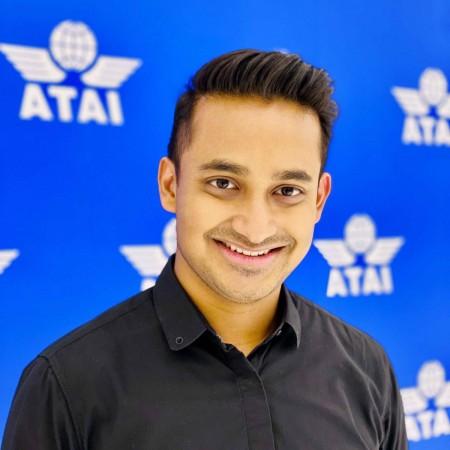
Growing up in a middle-class family in India, Vivek Adarsh poured all of his energy into two things: computers and aviation. These passions stayed with him throughout his life, and ultimately, he figured out a way to seamlessly combine the two. His formal education was in computer science; Vivek even went on to get a Ph.D. in the field where he specialized in developing predictive systems using machine learning for high-speed networks.
With a natural affinity for computers and technology, it makes sense that Vivek became a domain expert within his niche. Applying this expertise, he developed a framework called a "self-healing AI network" that could detect and understand adverse events. With the ability to get progressively smarter, this advanced system could be applied to many complex industries, but his passion for aviation drove Vivek to address some of the biggest challenges in the airline industry.
In order to apply the self-healing AI network in the airline industry, Vivek had to take the time to understand customer pain points – this was his planning process. Luckily, he had his own experience as a traveler to work off of. Before he graduated with his Ph.D., he was traveling back and forth to Europe for academic conferences and experienced 3 consecutive trips where his luggage was lost by major airlines. Not only did these instances inconvenience him and create multiple frustrating trips, but he realized that these experiences were not unique to him.
The complexities of the aviation industry can bring about challenges at so many different points when getting people and their bags from point A to point B. Weather, flight delays, mechanical failures, missed connections, and more can make baggage handling difficult. Being a problem-solver, Vivek applied his AI tool to learning about these problems. It constantly learns about what causes baggage issues, how to avoid them, and how to alert airlines of problematic factors that might need attention.
After planning, comes perseverance. With something as complex as AI technology within the aviation industry, Vivek had to work through complexities, making his solution robust enough to handle anything the industry could throw at it. Once ready, he founded AviAI and began connecting with leaders and executives at some of the top airlines. Since the industry has been using outdated technologies and legacy systems for decades, an injection of sophisticated technology has the ability to truly revolutionize aviation.
Now, AviAI is sponsored by the International Air Transport Association (IATA) which is a global aviation body that sets standards for the industry. This partnership is a major achievement as it brings visibility to Vivek's solution and connects AviAI with global airlines. To take things a step further, Vivek was invited to present AviAI at the World Passenger Symposium in Bahrain which is the largest aviation event of the year. After presenting to the hundreds of airlines in attendance, AviAI was approached by multiple executives to begin partnerships. Only 3 startups get to present each year, and, historically, startups are 4-5 years old before securing an invitation. AviAI was only a year old when Vivek presented at the symposium.
Working on a true passion isn't something that most people get to enjoy, but Vivek is lucky enough to work on two of his passions. Pairing his passions with planning and perseverance, he created a solution for an industry that is in need of some major changes. Not only does AviAI save airlines money by avoiding lost and mishandled bags, but it has the ability to make a difference in the travel experience of millions of people once it's fully rolled out.

















